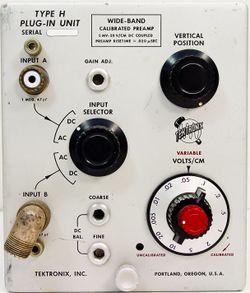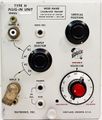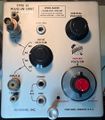H: Difference between revisions
No edit summary |
No edit summary |
||
| Line 8: | Line 8: | ||
discontinued=1971 | | discontinued=1971 | | ||
manuals= | manuals= | ||
* [[Media:110-008.pdf|Tektronix Type H Manual | * [[Media:110-008.pdf|Tektronix Type H Manual]] (110-008, sn 1102, PDF) | ||
* [[Media:070-272.pdf|Tektronix Type H Manual]] (later, 070-272, PDF, OCR) | |||
* [[Media: | |||
* [[Media:tektronix_type_h_schem.pdf|Tektronix Type H Schematics Only (PDF, OCR, bad-OCR)]] | * [[Media:tektronix_type_h_schem.pdf|Tektronix Type H Schematics Only (PDF, OCR, bad-OCR)]] | ||
* [[Media:tek_type_h_fcp.pdf|Tektronix Type H Factory Calibration Procedure (PDF, OCR)]] | * [[Media:tek_type_h_fcp.pdf|Tektronix Type H Factory Calibration Procedure (PDF, OCR)]] | ||
<!-- * [https://w140.com/tek_type_h_schematics.pdf Tektronix Type H Schematics Only (PDF)] --> | |||
}} | }} | ||
The '''Tektronix Type H''' is a single-channel, 15 MHz plug-in for [[500-series scopes]]. | The '''Tektronix Type H''' is a single-channel, 15 MHz plug-in for [[500-series scopes]]. | ||
| Line 20: | Line 19: | ||
A design compromise, Type H is not as fast as [[B|Type B]], but it is DC-coupled on all ranges. | A design compromise, Type H is not as fast as [[B|Type B]], but it is DC-coupled on all ranges. | ||
Type 53/54H was [[introduced in 1958]], along with the [[533]] and [[543]], renamed Type H in 1959, | Type 53/54H was [[introduced in 1958]], along with the [[533]] and [[543]], renamed Type H in 1959, and dropped after 1970. | ||
and dropped after 1970. | |||
{{BeginSpecs}} | {{BeginSpecs}} | ||
Revision as of 07:07, 12 August 2021
The Tektronix Type H is a single-channel, 15 MHz plug-in for 500-series scopes. It provides two inputs and has a switch to select between them.
A design compromise, Type H is not as fast as Type B, but it is DC-coupled on all ranges.
Type 53/54H was introduced in 1958, along with the 533 and 543, renamed Type H in 1959, and dropped after 1970.
Key Specifications
| Bandwidth | DC to 15 MHz |
|---|---|
| Rise time | 20 ns |
| Deflection | 5 mV/cm to 20 V/cm |
Internals
The input is switched via a frequency-compensated attenuator network which is controlled by the Volts/cm switch.
Later Type H models use a turret attenuator. Type H with S/N less than 10,000 have ordinary rotary switches.
Input is then coupled to the paraphase amplifier or phase inverter made up of two 12AU6 pentode tubes, V3854 and V4854. This stage converts the input signal to a differential push-pull output. Output of this stage is then passed to the first cathode follower, made with a 12AT7 dual triode, V3863A and V3863B. The output from this cathode follower is then passed to the main amplifier made with a pair of 12AU6 pentodes, V3874 and V4874. The final output to the scope chassis is driven via final cathode follower with a 12AT7 dual triode tube, V3893A and V3893B, which drives pin 1 and 3 of the connector to drive the vertical amplifier inside the chassis.
The tubes are heated from the +75 VDC heater supply available at pin 15 of the plug-in connector. This is to avoid any interference/hum from the regular AC heater supply at 60 Hz.
The chassis is shock-mounted to reduce microphonics.
Pictures
-
-
-
-
Type H Top
-
Type H Bottom
-
Type H Side
-
Early schematic
-
Late schematic
-
Turret attenuator schematic
-
Late model Type H with BNC inputs
-
Type H Grey Knob
-
Type H with turret attenuator












